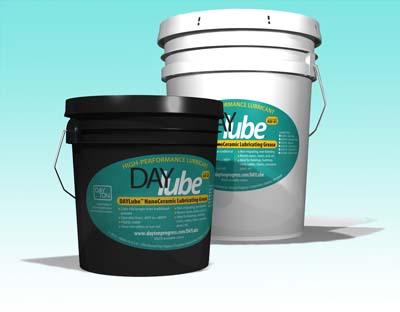
New DAYLube high performance grease, which uses nanoceramic particles that act as sub-microscopic ball bearings to provide continuous lubrication to steel surfaces, is now available in 1 and 5-gallon pails from Dayton Progress Inc. These new easy-carry and simple-to-use containers make DAYLube ideal for higher volume applications, especially conveyors, but also the protection of bearings, bushings cables, cams, chains, conveyors, gears, lifters, machine parts, robotics, slides, wear plates and more.
With a much lower coefficient of friction at all temperatures than traditional PTFE greases, chemically inert DAYLube is also environmentally friendly. It maintains its viscosity across full temperature range and is NSF-H1 Food Grade Certified. Extraordinary adhesion extends production up to 10-times that of other greases. This nanoceramic lubricating grease does not soften or run out — after 100,000 production strokes it shows no evidence of breaking down, the company reports. DAYLube provides unparalleled friction reduction and wear resistance.
DAYLube operates in temperature ranges from -40°F to 800°F and the nanoceramic particles remain intact to 2500°F. It survived the ASTME 4-ball weld test with no weld and minimal damage to all ball bearings. Competitive brands, on the other hand, produced a soft weld after 2 seconds and complete failure and major damage to all bearings, according to the company. DAYLube has high load-bearing properties, a low dielectric constant, does not contain metal or silicone and is resistant to steam, acids, and most chemical products.
"Customers using DAYLube report significantly longer service life, up to 10-times longer, than traditional PTFE lubricants," said Dayton Progress Marketing Communications Manager Bob Hedrick. "Even when compared to nanotechnology products, DAYLube has a lower cost per ounce. When considering all factors there is not a better lubricating value than DAYLube."
In addition to the new 1 and 5-gallon pails, DAYLube is available in 16-ounce tubes and 16-ounce jars, as well as cases of 12 each (jars or tubes).
Contact Details
Related Glossary Terms
- robotics
robotics
Discipline involving self-actuating and self-operating devices. Robots frequently imitate human capabilities, including the ability to manipulate physical objects while evaluating and reacting appropriately to various stimuli. See industrial robot; robot.
- wear resistance
wear resistance
Ability of the tool to withstand stresses that cause it to wear during cutting; an attribute linked to alloy composition, base material, thermal conditions, type of tooling and operation and other variables.






